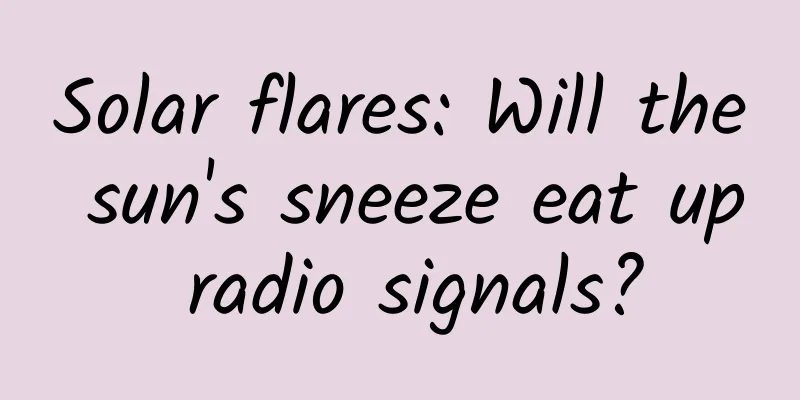Solar flares: Will the sun's sneeze eat up radio signals?

|
Solar flares are sudden and bright phenomena on the surface of the sun, which release huge amounts of energy, including light, heat, radiation and charged particles. These charged particles fly toward the earth at extremely high speeds and collide with atoms in the atmosphere when they reach the earth's atmosphere, producing a large amount of ionization. The ionosphere is a layer of Earth's atmosphere made up of atoms and molecules ionized by solar radiation. The ionosphere reflects radio waves, making it essential for radio communications. Solar flares can have the following effects on the ionosphere: (1) Increased electron density in the ionosphere: This leads to increased absorption and scattering of radio waves, thus weakening or even interrupting radio communication signals. (2) Changing the shape of the ionosphere: This will cause the propagation path of radio waves to change, thereby reducing the quality of radio communications. (3) Generation of ionospheric currents: This can cause noise and interference to radio equipment. The impact of solar flares on radio communications is mainly reflected in the following aspects: Shortwave communication: Shortwave communication is a way of communicating by reflecting radio waves from the ionosphere. Solar flares can cause shortwave communication signals to attenuate or even be interrupted. Satellite communication: Satellite communication is a method of communication that uses artificial satellites to relay radio signals. Solar flares can cause attenuation and delay of satellite communication signals. Navigation system: A navigation system, such as GPS, uses satellite signals for positioning and navigation. Solar flares can cause the accuracy of navigation systems to decrease or even fail. Here are some things you can do to mitigate the effects of solar flares on radio communications: Use multiple communication methods: Using multiple communication methods can reduce dependence on a single communication method, thereby improving the anti-interference ability of the communication system. · Use of anti-interference equipment: Anti-interference equipment can be used to reduce the effects of solar flares on radio communication equipment. Timely access to space weather forecasts: Timely access to space weather forecasts can help preventive measures be taken in advance to reduce the impact of solar flares on radio communications. Solar flares are a natural phenomenon that can have a significant impact on radio communications. Understanding the characteristics of solar flares and their impact on radio communications is of great significance for improving the anti-interference ability of communication systems. Source: Chongqing Radio Science Popularization Experience Center Audit expert: Yang Yaohui Statement: Except for original content and special notes, some pictures are from the Internet. They are not for commercial purposes and are only used as popular science materials. The copyright belongs to the original authors. If there is any infringement, please contact us to delete them. |
<<: Trans fatty acids: Why are they the "unwelcome guest" in the food world?
Recommend
There is a 2000 yuan original project outside. If you make 6-8 videos per day, it is easy to earn over 100 yuan.
There is a 2000 yuan original project outside. Yo...
Ten thousand words long article! A very comprehensive guide to B-side product design
This article wants to discuss with you how B-side...
"Fighting fire with fire" space combustion experiment - Why is fire in space so exciting?
In February this year, the Combustion Science Exp...
In ten years, iPhone has changed our lives like this
Ten years ago, Nokia was still the unrivaled lead...
My Map Navigation
Source code introduction Based on Baidu LBS, real...
“Why is Perfect Diary so popular?” DTC model practice behind the analysis
The emergence of DTC as a new business form has b...
Advertising data and cases in the home improvement industry
This article shares with you the investment ideas...
You must pay attention to these issues when upgrading to Windows 10
Microsoft's Windows 10 operating system will ...
How far can a telescope see? There is no farthest, only farther...
"How far can your telescope see?" This ...
Shandong's magic car Qilu ec1 is here, benchmarking Wuling Hongguang MINI EV, and the size is actually bigger
Along with the wave of new energy, electrificatio...
Do you think you are feeling sleepy during the spring? It may be your body's signal for help.
Spring is here, everything comes back to life Man...
Low cost, high exposure, advertising optimization model!
How to optimize the effectiveness of advertising,...
The "magic weapon" for weight loss, the sweat-inducing suit, will make you pay the "IQ tax"?
As the temperature gradually rises, many beauty l...
Fairy-like, the third phase of "Nantianmen" is connected to the subway? Netizens: Journey to the West is still too conservative
March 24 A netizen posted a video on a bridge in ...
How to write a good introduction to a planning proposal?
How to write a good opening statement for a plann...









